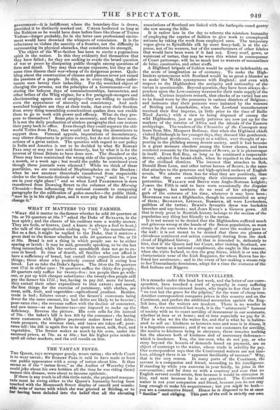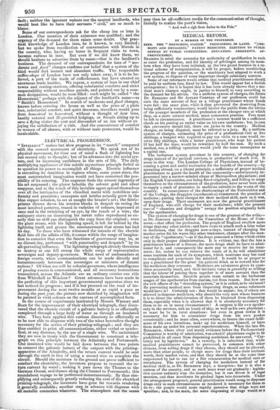TAX UPON TRAVELLERS.
OUR remarks under this head last week, and the letter of our corre- spondent, have touched a cord of sympathy in many suffering pockets and inconvenienced hearts, who begin to fear that there is "no rest but the grave for the pilgrim," for the want of cheap inns. Another correspondent compares prices in this country and on the Continent, and prefers the additional accusation against the Eng- lish inns, that the waiters are insolent. 'f here is no wonder in that. As we mentioned last week, it is the "aristocratic" humour of society with us to exact servility of demeanour in our assistants, whether at inns or at home; and at inns especially we pay for it. That is what we fee the waiter for, and that is what he is habitu- ated to sell us : kindness as between man and man is in disuse, it is a forgotten commerce ; and if we are not customers for servility; the motive to kindness being in abeyance, there remains nothing but the absence both of kindness and of mercenary deference— which is insolence. You, the inn-user, who do not pay, or who stray beyond the bounds of demands based on payment, are an object of contempt to the waiter, whose trade is servility for pay. Our correspondent says that the Continental waiters are not inso- lent, although there is an "apparent familiarity of manner." Why, that is the very reason, in many parts of the Continent, the servant is a companion and friend, according to his intelligence. If standing by while you converse in your family, he joins in the conversation; and he does so with a courtesy and ease that n.o English servant could attain, first because it would be obtrusion in him, and next because he is not practised. The Continental waiter is not your companion and friend, because you do not stay long enough to make his acquaintance; but you might be both— you are a constructive friend. Hence he is disposed to be at once "familiar" and obliging. This part of the evil is strictly our tviVn
fitult ; neither the ignorant waiters nor the neutral landlords, who would best like to have their servants "civil," are so much to blame.
Some of our correspondents ask for the cheap inn or inns in London. Our mention of their existence was qualified; and the urgency of the demand for them raises some doubt. Our prac- tical knowledge of London inns, be it known, is very limited ; but we spoke from recollection of conversation with friends in the country, who, having no home in frequent visits to town, became curious in inns. But even if we did know them, we should hesitate to advertise them by name—that is the landlord's business. The demand of our correspondents for inns of "mo- derate and fixed" charges confirms our belief that a system of the kind would find instant and abundant traffic. The respectable coffee-shops of London have not only taken away, it is to be be- lieved, a part of the trade of coffeehouses, but have created an enormous trade besides. We repeat, a system of inns in our chief towns and resting-stations, offering substantial comforts and strict respectability without needless parade, and pointed out by a com- mon designation, would be soon filled : each might be called" the Homestead," perhaps with the adjunct of the landlord's name—as "Smith's Homestead." In search of moderate andfized charges, known before entering the house as well as the price of a plain bun, substantial comfort, and quiet decorum, travellers would pass from homestead to homestead, without a thought of dear inns, hastily entered and ill-provided lodgings, or friends sitting up to save a flying visiter the cost and discomfort of an inn without en joying the satisfaction of a visit. And the convenience of comfort to women of all classes, with or without male protectors, would be incalculable.



























 Previous page
Previous page